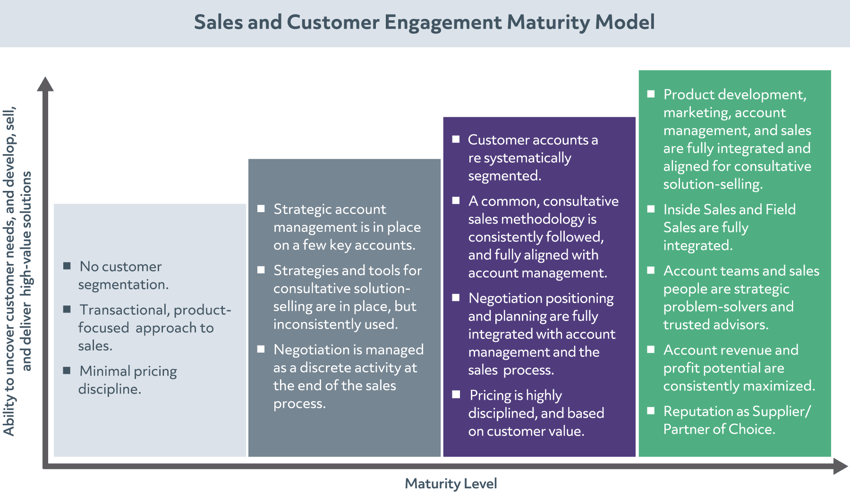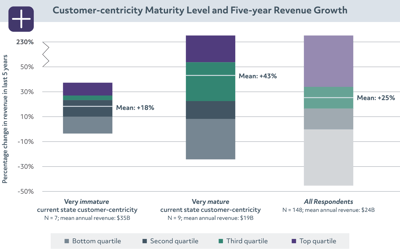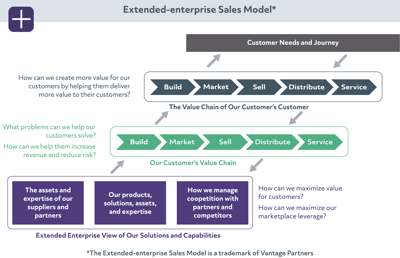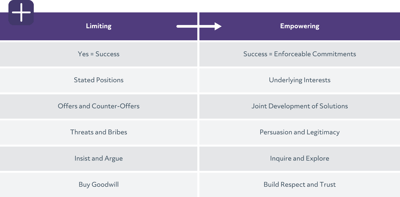The world does not lack for sales and customer account management methodologies. Virtually all of them have some merit, but initiatives to implement new sales processes and roll out training on sales and account management often fail to deliver desired results. Sustained revenue growth and enhanced profit margins require a more holistic approach, one that integrates sales effectiveness and key account management with a cross-functional commitment to customer-centricity.

As Peter Drucker observed, the purpose of any business is to create and keep a customer. While customer-centricity is often thrown around as a buzzword, our research shows that a genuine commitment to customer-centricity leads to faster revenue growth.
|
Insights | Customer-Centricity: What Separates the Best from the Rest Over the past few years, customer-centricity has become a hot topic, and with good reason. Unfortunately, there is a great deal of confusion about what customer-centricity is and how to put its principles into practice. To begin cutting through the hype, we put forward a model that defines four distinct levels of customer centricity and describe five practices that comprise world-class customer centricity. |
 Making customer-centricity a reality requires rethinking and transforming all enterprise functions that affect a customer, from product development to after-sales service. Delivering differentiated value to customers requires skilled salespeople, but it also requires early and systematic voice-of-customer input to product and solution development. Success similarly requires breaking down silos and enhancing collaboration between R&D, Marketing, Sales, and Customer Service.
Making customer-centricity a reality requires rethinking and transforming all enterprise functions that affect a customer, from product development to after-sales service. Delivering differentiated value to customers requires skilled salespeople, but it also requires early and systematic voice-of-customer input to product and solution development. Success similarly requires breaking down silos and enhancing collaboration between R&D, Marketing, Sales, and Customer Service.
The essence of sales is connection — between a company's products, services, and capabilities on the one hand and customer needs on the other. Effective salespeople combine knowledge of their company's solutions with a deep knowledge of their customer's business and the challenges and opportunities they face.
Depending on a company's business model and strategy, such connectivity may be primarily a function of curation (identifying which products and/or services are most relevant to a given customer) and explanation (showing how those products and/or services directly address one or more customer business needs). Alternatively, this connectivity sometimes involves cross-functional efforts to configure customized solutions for customers or develop new, bespoke solutions that leverage a company's unique assets and capabilities.
The key to sales success is to start from customer needs and then map back to a company's solutions. Sales and account teams need to understand their customers at a deeper level by analyzing the needs of the customers they serve. This creates a foundation for solution-oriented selling focused on helping customers succeed by enabling them to deliver more value to their customers.
| Insights | Putting the Strategic Back in Strategic Account Management |
| SAMs, because they sit at the nexus of two companies — their own and their key account — are constantly pulled in multiple, often conflicting directions. It's easy to be consumed by urgent opportunities and challenges — to the detriment of thinking and operating in a fully strategic way. |
| Read Article> |
Delivering greater value to customers often requires bundling products and services from multiple business units — thereby creating more comprehensive and differentiated solutions as well as streamlining the customer buying experience. Unfortunately, internal complexity is often a major hurdle. But it can be overcome — by more clearly communicating the benefits of cross-selling, while also making cross-selling easier and more efficient for sales teams.
|
Insights | Align Internally for Better Cross-Selling The value proposition for cross-selling is simple: combine the power of multiple offerings to deliver increased benefits for your customer and grow your share of customer spend in the process. Executing a sale across business units is rarely that simple however, and the majority of companies are unable to reliably capitalize on the tremendous opportunity available to them by better penetrating their accounts. |
Delivering value to customers is the North Star of revenue growth and margin protection or enhancement. But unless that value is effectively communicated and then defended during sales negotiations, even the most innovative and customer-centric companies will fail to reap the benefits. The increasing influence of Procurement in many companies adds another layer of challenge; better negotiation strategies and skills, augmented by independent pricing and deal review teams, are the solution.

|
Insights | Extreme Negotiations with Customers As the Covid-19 pandemic forces companies to confront shrinking demand, higher levels of unused inventory, and increased uncertainty, impacted businesses with undoubtedly turn to their suppliers for cost savings while also seeking guarantees of supply assurance. Sales teams, meanwhile, will be under pressure to work collaboratively with customers to address their very real problems while simultaneously protecting their own revenue and margins. |
Sales is, by its nature, a transactional discipline focused on closing deals. A well-designed sales process, executed by skilled salespeople, will close more and better deals, and do so more efficiently, by better connecting a company's solutions to customer needs. But something more is called for to maximize the revenue and profit potential of a company's largest and most important customers. Effective sales must be enabled and augmented by strategic management of relationships with those customers.
Made with Visme Infographic Maker
Made with Visme Infographic Maker
With the advent of Covid-19 vaccines, F2F interactions with customers will resume. But the importance of virtual sales skills is not going away. Future success will require enhanced integration of virtual and F2F sales. Companies that master the art of hybrid selling will increase both sales efficiency and sales effectiveness.
Related Resources
All material contained on this website (except where noted) © Copyright 2024 Vantage Partners, LLC. All rights reserved.
+1.617.904.7800